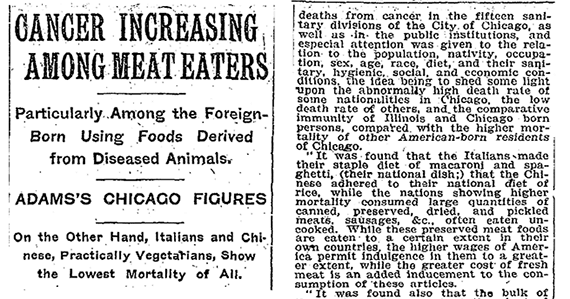
1907 New York Times Article Shows that Meat Causes Cancer. A Century Later, Many People Still Haven’t Heard the News
In a recent NPR debate about the risks of meat-eating, I put forward the proposition that meat causes cancer. Judging by faces in the audience, this was a new idea. While everyone understands the link between cancer and cigarettes, the link with meat has somehow escaped notice.
I cited two enormous studies—the 2009 NIH-AARP study, with half a million participants, and a 2012 Harvard study with 120,000 participants. In both studies, meat-eaters were at higher risk of a cancer death, and many more studies have shown the same thing.
How does meat cause cancer?
It could be the heterocyclic amines—carcinogens that form as meat is cooked. It could also be the polycyclic aromatic hydrocarbons or the heme iron in meat, or perhaps its lack of fiber and paucity of antioxidants. But really the situation is like tobacco. We know tobacco causes lung cancer, even though no one yet knows exactly which part of the tobacco smoke is the major culprit. And although meat-eaters clearly have higher cancer rates, it is not yet clear which part of meat does the deed.
The tragedy is this: The link between meat and cancer has been known for more than a century. On September 24, 1907, the New York Times published an article entitled “Cancer Increasing among Meat Eaters,” which described a seven-year epidemiological study showing that meat-eaters were at high cancer risk, compared with those choosing other staples. Focusing especially on immigrants who had abandoned traditional, largely planted-based, diets in favor of meatier fare in the U.S., the lead researcher said, “There cannot be the slightest question that the great increase in cancer among the foreign-born over the prevalence of that disease in their native countries is due to the increased consumption of animal foods….”
Over the past century, meat eating in America has soared, as have cancer statistics. USDA figures show that meat eating rose from 123.9 pounds of meat per person per year in 1909 to 201.5 pounds in 2004.
The good news is that many have woken up and smelled the carcinogens. They know there is plenty of protein in beans, grains, and vegetables, and that traditional Italian, Mexican, Chinese, Thai, Japanese foods—and endless other cuisines—turn these plant-based staples into delicious and nourishing meals. Meat eating has fallen about one percent every year since 2004.
If you haven’t yet kicked the habit, now is the perfect time to do it. The Physicians Committee for Responsible Medicine has you covered with Kickstart programs, books, DVDs, and everything else you’ll ever need. Let’s not wait another hundred years.
Article originally published on PCRM.org
About the Author

About the Author
Neal Barnard, MD, FACC
Join our mailing list
Get free recipes and the latest info on living a happy, healthy plant-based lifestyle.
By providing your email address, you consent to receive newsletter emails from Forks Over Knives. We value your privacy and will keep your email address safe. You may unsubscribe from our emails at any time.
